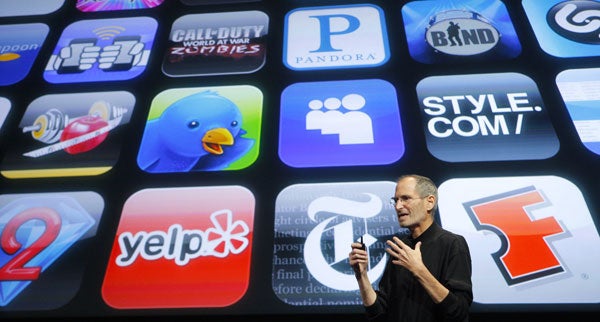Why Apple is a tasty job option
A survey shows that banks are losing out in the popularity stakes to the new digital elite. Steve McCormack probes the latest trend

Your support helps us to tell the story
From reproductive rights to climate change to Big Tech, The Independent is on the ground when the story is developing. Whether it's investigating the financials of Elon Musk's pro-Trump PAC or producing our latest documentary, 'The A Word', which shines a light on the American women fighting for reproductive rights, we know how important it is to parse out the facts from the messaging.
At such a critical moment in US history, we need reporters on the ground. Your donation allows us to keep sending journalists to speak to both sides of the story.
The Independent is trusted by Americans across the entire political spectrum. And unlike many other quality news outlets, we choose not to lock Americans out of our reporting and analysis with paywalls. We believe quality journalism should be available to everyone, paid for by those who can afford it.
Your support makes all the difference.We may be crawling our way out of the recession, but the severity of the downturn has left its casualties, among them a bruised reputation for the banking and finance sector, which was blamed by most for bringing the world to near economic meltdown.
There's powerful evidence for this loss of prestige in the results of this year's survey of British undergraduates' job aspirations by the Swedish research firm Universum. Every year for the last decade, Universum, which describes itself as an employer branding organisation, has questioned students on their perceptions, preferences and expectations in the world of work. It has also asked each respondent to select, from a list of more than a hundred organisations, his or her top five "ideal employers," giving reasons.
This year's survey, of more than 12,000 students, carried out between last November and this March, shows a plummeting popularity among leading banking and finance institutions, formerly regarded as the most desirable of employers.
Among students on business and commerce courses, the firms that a year ago filled the top three places have all lost their lustre. The bank and financial firm J P Morgan slid 13 places; PricewaterhouseCoopers has dropped two places, and Goldman Sachs is down six positions. Other significant drops among the same students include Morgan Stanley (12 places down), Deutsche Bank (20), Lloyds TSB (14), Credit Suisse (29) and the Royal Bank of Scotland (17).
Filling the gap in the popularity stakes are employers associated with IT, the internet and media. Apple, Google and the BBC fill the top three spots, with Microsoft, Sky, John Lewis and the NHS also rising up the rankings by more than 10 places.
These changing verdicts on the desirability of potential employers, and the detailed reasoning given by students for arriving at their conclusions, clearly present food for thought for the HR departments of leading companies, which use Universum's data to tailor recruitment campaigns. "The repercussions of the banking crisis will have significant effects on the recruiting abilities of employers," says Anne Margrethe Mannerfelt, Universum's director for western Europe.
"The war for talented recruits is re-emerging, and many employers from the banking and finance sector which are fighting for top talent may be pipped to the post by employers with a better image."
Among students in other subject areas, the results reflect fewer differences from last year. Engineering and IT students, for example, have collectively selected the same top-five firms as last year, namely Google, Microsoft, Apple, IBM and Rolls Royce.
Apple's consolidation among the super-popular firms is perhaps unsurprising, given the ubiquity on campuses and elsewhere of iPods and iPhones. But until last year, the firm wasn't even on Universum's list of employers presented to students.
"Including Apple in our list of employers was a bit controversial, because they don't do a lot of graduate recruitment in the UK," says Michelle Boyde, Universum's university relations manager in the UK. "But now it certainly feels as if Apple is going in the same direction as Google, which is at the top of our global rankings."
Another striking trend is the gradual rise of green employers up the rankings. A stand-out mover in the engineering and IT students' list is the Environment Agency, which has risen 12 places to 21st spot. And there is similar evidence in the preferences of natural sciences students, where the renewable energy firm RWE npower has climbed an amazing 65 places to 43rd. The NHS, the drugs firm GlaxoSmithKline and the Environment Agency continue to fill the top-three spots among science students, although in a slightly different order. Amid the snakes and ladders of employer popularity, though, undergraduates' overall career goals have remained fairly consistent, as have the expectations they have of an employer. Like last year, work-life balance is still the most important goal, followed by the desire for security and stability in a job, a factor that, not surprisingly has been edging its way up the list for the past couple of years.
As far as employers' attributes are concerned, the students listed good reputation, market success and financial strength as the three most important characteristics for an ideal employer. In that light, it's not hard to grasp why the banks and financial institutions have slipped in the rankings.
"We know which attributes students value," says Mannerfelt, "and this year we can see that the employers with weaker employer brands are simply not associated with these attributes anymore."
Join our commenting forum
Join thought-provoking conversations, follow other Independent readers and see their replies
Comments